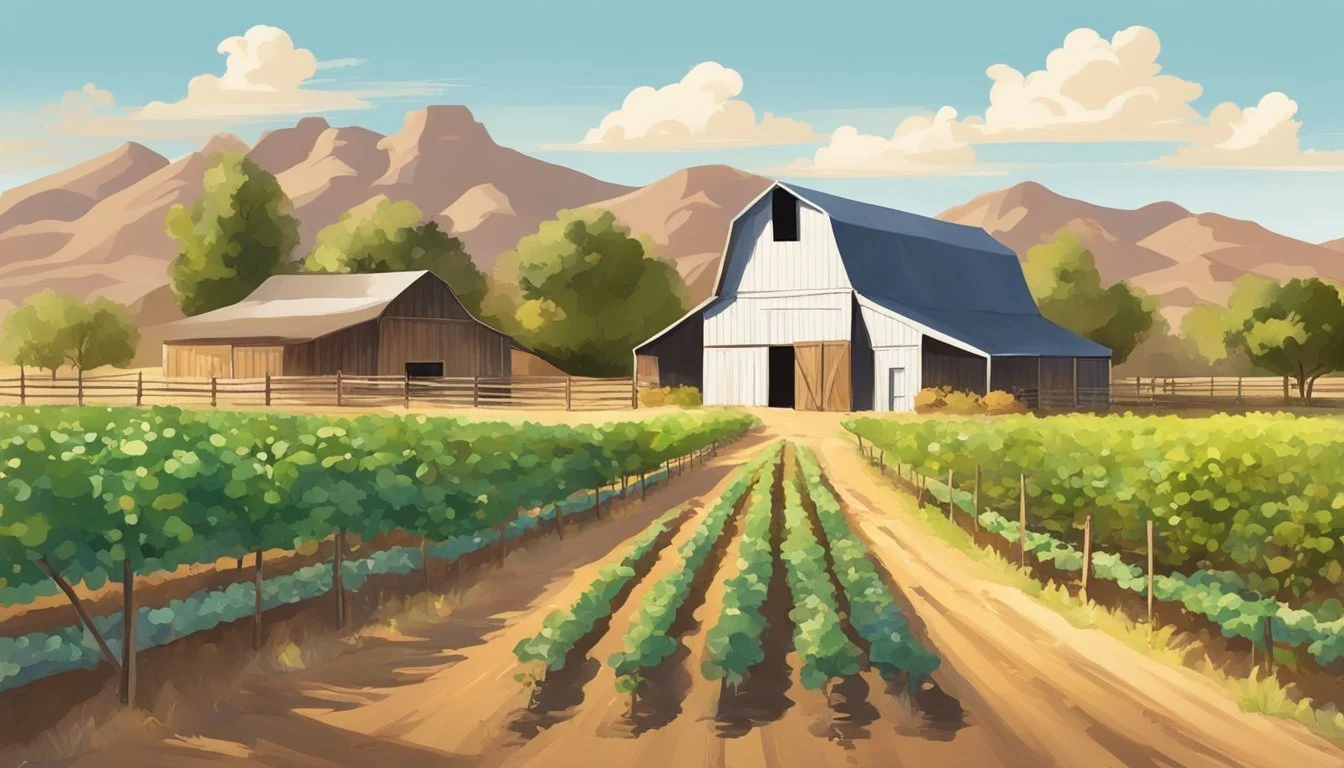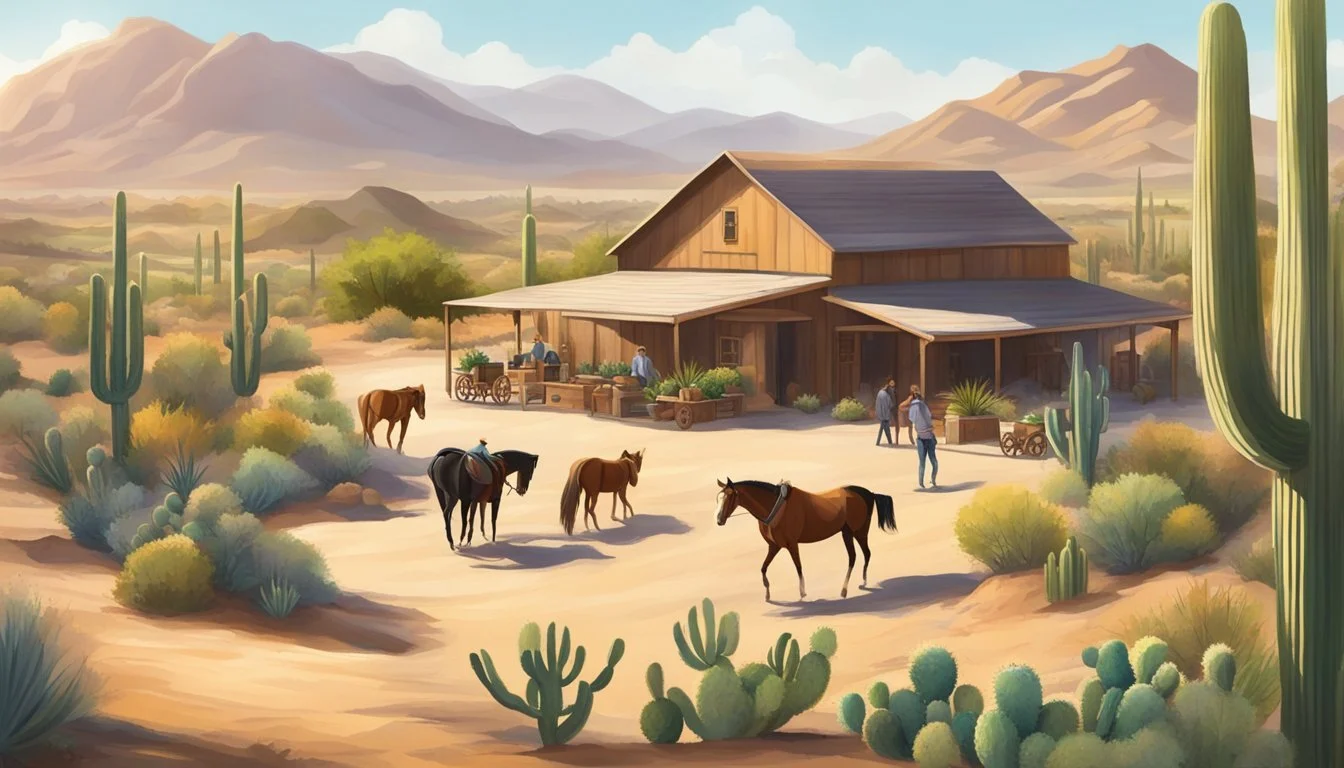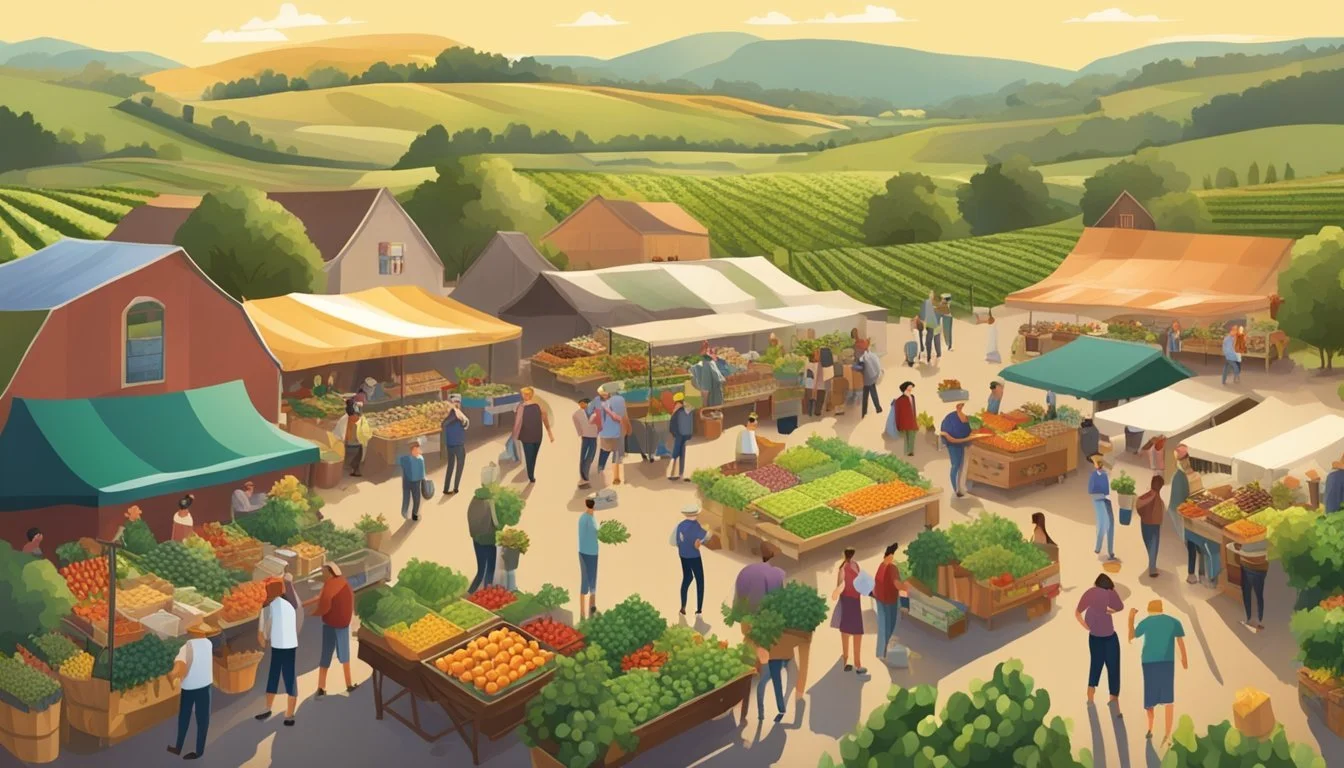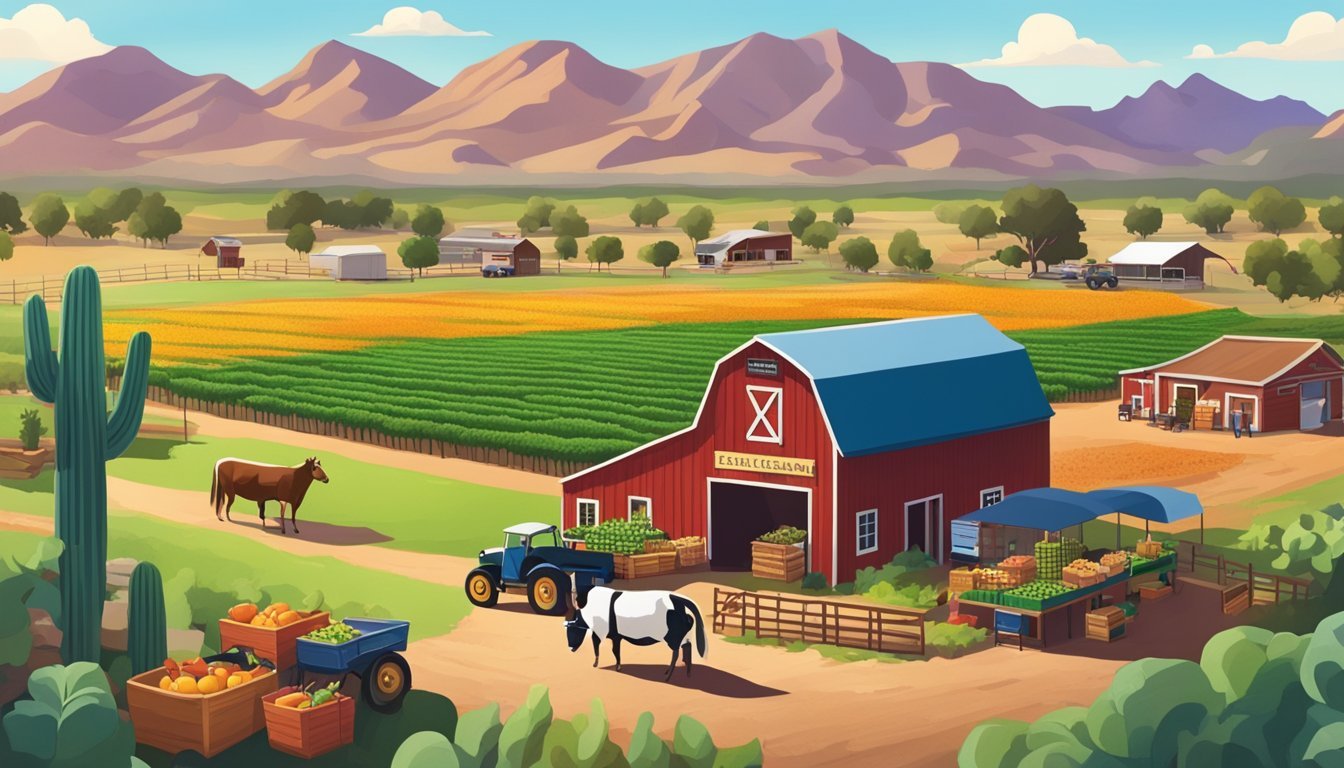Agritourism in Arizona
Gateway to Authentic Farm Experiences
Agritourism in Arizona embodies a unique intersection of agriculture and tourism that offers an immersive experience into the heart of the state’s farm life. With its diverse landscape and bountiful resources, Arizona is a prime location for agritourism, providing a plethora of activities ranging from you-pick farms to educational tours. Visitors can learn firsthand about the state's agricultural processes and enjoy fresh, local produce, enhancing their appreciation for farming communities.
The agritourism sector in Arizona is noted for adding versatility and economic value to its traditional farming and ranching operations. This fusion enables agriculturalists to diversify their income streams while providing educational and entertainment experiences for locals and tourists alike. Notable agritourism destinations include lavender farms in Concho that showcase beautiful floral operations, vineyards in Cottonwood offering wine enthusiasts a taste of local flavors, and farm-to-plate experiences that promote Arizona's culinary heritage.
The industry plays a significant role in Arizona’s economy, with contributions exceeding billions annually. It is powered by the synergy of natural factors like ample sunshine, rich soil, and quality irrigation water combined with the state's innovative approach to agriculture. Such factors make Arizona’s agritourism an attractive and growing sector, inviting visitors to engage with the state's rich agricultural tapestry.
Understanding Agritourism
Agritourism presents an intersection of agriculture and tourism sector to support local farmers and economy, along with providing educational and entertainment value to visitors.
Definition and Importance of Agritourism
Agritourism is the practice that combines aspects of the agriculture industry with tourism. Visitors engage with activities such as picking fruits, attending farm-to-table dinners, and participating in educational workshops. This form of tourism provides a vital source of supplemental income to farmers while offering the public a way to experience and learn about rural life and food production.
Legislation and Regulatory Issues
Legislation surrounding agritourism ensures the safety and regulation of activities provided by agricultural properties. Regulatory issues often involve land use, health and safety standards, and liability. States have implemented specific agritourism laws to encourage the growth of the industry while protecting both the hosts and the visitors.
The Role of Agritourism in Arizona's Economy
Given the growing interest in where and how food is produced, agritourism in Arizona has seen considerable growth. According to recent census data, it accounted for about $14 million in sales, demonstrating its emerging role in the state economy. Agritourism helps to support the financial stability of farms and contributes to the broader economic development of rural areas.
The Farms of Arizona
The agritourism destinations within Arizona showcase a wide range of farming activities, offering visitors a diverse experience, from u-pick fruit orchards to sustainable vineyards practicing meticulous soil management.
Diversity of Arizona Farms
Arizona's farms vary from sprawling citrus orchards in the Lehi Valley to the vineyards thriving in the state's three major wine-growing regions. Visitors can find farms cultivating a plethora of produce including apples, peaches, and an array of vegetables. In addition to traditional produce, Arizona also includes farms specializing in pecan and pistachio orchards, as well as fields of cotton.
Seasonal Events and Harvests
Throughout the year, Arizona's agritourism spots celebrate the changing seasons with specialized events. For example:
Spring: Orchards offer blossom tours and the beginning of the u-pick season for certain fruits.
Summer: The peak of u-pick activities for stone fruits and preparation for grape harvests.
Fall: Pumpkin patches and corn mazes become popular.
Winter: Citrus harvests commence, and farms may offer holiday-themed events.
These events provide the public with an opportunity to engage directly with Arizona's agricultural bounty.
Agricultural Practices and Sustainability
Many Arizona farms focus on sustainable practices, emphasizing soil health and water conservation to ensure long-term viability. They make considerable efforts to reduce their carbon footprint, such as:
Utilizing drip irrigation systems to conserve water.
Implementing integrated pest management to reduce the need for chemicals.
Planting cover crops to protect and enrich the soil.
These practices reflect the farms' commitments to sustainability and responsible stewardship of the environment while producing high-quality agriculture products.
Tourism and Activities
Arizona's agritourism offers a diverse range of activities, combining the beauty of the state's agricultural landscapes with interactive and educational experiences. Tourists can engage with the land, learn from local farmers, and participate in activities that blend agriculture and tourism seamlessly.
Farm Tours and U-Pick Experiences
Visitors looking for a hands-on experience can participate in farm tours and U-pick orchards. These tours often showcase the inner workings of a farm, allowing guests to see where their food comes from, and U-pick experiences offer the pleasure of harvesting one's own produce. Key destinations include family-friendly farms with diverse offerings such as seasonal fruits and vegetables ripe for picking.
Agritainment and Events
The blend of agriculture and entertainment, or agritainment, provides tourists with fun activities that can range from corn mazes in the fall to live music events hosted on farm grounds. Seasonal events often bring bustling farmer's markets where local artisans and growers sell fresh produce and handmade goods. Agritourism in Arizona also includes wine tours in the state’s major wine-growing regions, blending the tasting experience with scenic vineyard tours.
Educational Opportunities in Agritourism
Agritourism serves as an educational platform where individuals of all ages can learn about farming and sustainable agriculture. This educational facet includes workshops on farming practices, cooking demonstrations using local produce, and programs tailored for children to engage them in agricultural practices. Many farms integrate educational components into their tours, making the learning process both enjoyable and memorable.
Local Products and Produce
Arizona's agritourism is a thriving sector that showcases a wide range of local products and produce. Tourists can explore the state's rich agricultural offerings, experiencing firsthand the quality and diversity of Arizona's farm-produced goods.
Promoting Local Agriculture
In Arizona, agritourism initiatives serve as a platform to promote local agriculture. Farms across the state invite visitors to pick-your-own fruits and vegetables, a hands-on experience that enables consumers to connect with the sources of their food. The state's agriculture is varied:
Fruits: Visitors can pick apples and oranges directly from the orchards.
Vineyards: Local vineyards offer wine tastings and tours, highlighting the region's grapes.
Olives: Olive farms, such as the Queen Creek Olive Mill, produce high-quality olive oil.
Pumpkins and Lavender: Farms like Red Rock Lavender offer a scenic backdrop with their lavender fields, while pumpkin patches become family attractions in the fall.
From Farms to Culinary Delights
Arizona agritourism bridges the gap from farms to culinary delights:
Farm to Table: Restaurants incorporate farm-sourced ingredients, creating fresh and seasonal menus.
Meat: Local meats are often featured, providing a taste of the region's livestock rearing practices.
Value-Added Products: Unique items such as goat milk ice cream showcase the creativity of local producers, turning simple ingredients into gourmet products.
By engaging in these agritourism activities, tourists not only support local farmers but also enjoy the freshest produce and a taste of Arizona's culinary scene.
Seasonal Aspects of Agritourism
Agritourism in Arizona offers distinct experiences as the seasons change, providing an array of activities from fruit harvests to festive gatherings that showcase the state's agricultural heritage throughout the year.
Spring and Summer Delights
In spring and summer, agrarian pursuits abound—visitors can enjoy the blooming orchards with peach picking becoming a delightful draw. Warm weather brings an abundance of outdoor activities, with many farms offering tours where one can witness the full swing of planting and cultivation.
Farmers' markets are brimming with fresh produce, often accompanied by educational workshops on sustainability and agriculture. Such events highlight the importance of seasonality in farm-to-table dining.
Fall Festivities and Harvest
The fall harvest is an especially vibrant time for Arizona's agritourism, bringing with it the pumpkin and chili parties that locals and tourists eagerly await. This period sees corn mazes and pumpkin patches dotting the landscape, offering traditional autumnal experiences.
Apple picking: Farms burst into action, allowing visitors to pick their apples straight from the tree.
Festive events: Themed activities center around the fall harvest, celebrating the bounty with food fairs and culinary showcases.
Winter Experiences
During the winter months, the agritourism industry in Arizona continues to thrive. The state's mild winters allow for certain crops to grow and for agritourism activities to continue, unlike in states with harsher winter conditions.
Farms often turn into event spaces for the holidays, hosting workshops and gatherings that make the most of the cooler weather. Visitors may engage in activities like holiday markets or enjoy the serene beauty of a farm stay, experiencing rural life even in the chill of winter.
Arizona Agritourism Destinations
Arizona provides a varied landscape for agritourism, offering visitors an opportunity to enjoy and learn from farms and vineyards that boast of unique experiences and quality produce. From aromatic lavender fields to lush vineyards, the Grand Canyon State hosts a range of agricultural delights.
Schnepf Farms: A Model for Agritourism Excellence
Schnepf Farms sets a high standard for agritourism, drawing visitors to its diverse offerings year-round. Family-owned, the farm is renowned for its peach orchards, seasonal festivals, and educational tours. It integrates entertainment with agriculture, allowing visitors to pick their fruits and partake in outdoor activities.
Unique Agritourism Venues in Arizona
Red Rock Lavender: Located in Concho, this farm is a shift from typical expectations, showcasing fragrant fields of lavender where once vegetables and orchards might have been.
Hayden Flour Mills: At this venue, guests can learn about the historical and modern milling processes that produce artisanal flour from local grains.
Queen Creek Olive Mill: Visitors experience Arizona's unique take on olive farming, engaging in tours and tastings of premium olive oils.
Wine-Growing Regions and Vineyard Tours
Arizona’s wine-growing regions are making a name for themselves, particularly in areas like Sonoita, Willcox, and the Verde Valley. They are gaining recognition for cultivating grapes that thrive in Arizona’s climate:
Cabernet Sauvignon and Grenache: These robust red wines are found in various vineyards, reflecting the richness of the state's terroir.
Syrah and Viognier: These varieties also show the versatility of Arizona’s wine country, with Syrah offering spicy complexities and Viognier presenting aromatic bouquets.
Tours often provide a behind-the-scenes look at the wine-making process and the chance to sample these locally produced wines amidst the scenic backdrop of Arizona’s landscapes.
Community and Economic Impact
Agritourism in Arizona not only strengthens the bond between consumers and their food sources but also invigorates the local economy through various channels.
Building a Community around Agriculture
Agritourism has become a pivotal means for farmers to create a sense of community among local residents. It allows for the sharing of agricultural practices and fosters relationships between producers and consumers. Educational activities and farm tours engage families, strengthening community identity around the shared value of sustainable agriculture.
Economic Influence and Benefits
The proliferation of agritourism has significant economic repercussions for Arizona. It diversifies farmers' income streams and can augment property tax revenues for the state. These operations offer a unique employment niche, bolstering job opportunities for locals. The Fresh Foodie Trail, for example, directly supports Arizona's economy by drawing visitors to explore local farms and food productions.
Economic Indicators:
Increase in agritourism-related sales, reaching approximately $14 million.
Job creation in tour and event hosting.
Enhanced property tax revenue from agritourism activities.
Contributions to Local Markets and Restaurants
Local markets and restaurants experience fresh vitality from agritourism. With a focus on "locavore" menus, chefs have access to a wealth of locally produced ingredients, resulting in dishes that attract both locals and tourists. The direct link with farms through agritourism often translates into a reliable stream of fresh, seasonal produce for these establishments, supporting local agriculture while delivering culinary innovation.
Local Contributions:
Steady supply of fresh ingredients to restaurants.
Promotion of farmers’ markets as a food source for Arizona’s culinary scene.
Opportunities for restaurants to partner with farms in event hosting.
Challenges and Opportunities
In Arizona, agritourism presents a unique set of challenges and opportunities, directly impacting the sustainability and growth of agriculture. This section explores the difficulties operators may face and the potential for agritourism to expand, offering positive prospects for the future.
Navigating the Challenges of Agritourism
Agritourism operators in Arizona confront various challenges. The COVID-19 pandemic introduced social distancing requirements, which led farms to adjust visitation policies to ensure the safety of visitors and staff. Another significant challenge is the sustainability of agriculture, where maintaining profitable operations can be strenuous for small to mid-size farms. These enterprises must balance traditional farming activities with the demands of hosting visitors, often requiring additional insurance and marketing skills.
Future Potential and Growth Opportunities
Despite the challenges, there is substantial opportunity for growth in Arizona's agritourism sector. The state's farms and ranches could leverage existing tourism infrastructure to entice visitors, offering experiences like "pick-your-own fruits and vegetables", wine tastings, and tours highlighting local food production. Arizona's rich tribal heritage and the presence of over 19,000 Native farmers provide a unique niche for developing tribal agritourism. This creates avenues for cultural exchange and education, enhancing sustainability efforts through direct sales and fostering stronger connections to the land.
Resource and Reference Section
In Arizona, agritourism has become an integral part of the state's agricultural landscape, marrying agriculture with tourism to offer a diverse range of experiences. The resources available to those interested in agritourism in Arizona are extensive and cater to various aspects ranging from business planning to natural resource conservation.
State-Supported Organizations and Resources:
Arizona Agritourism Association: Provides support and networking opportunities for agritourism operators.
Arizona Farm Bureau's Agritourism Directory: Lists agritourism farms for easy visitor access.
University of Arizona Cooperative Extension: Offers guidance on agritourism best practices and rural development programs.
Key References:
Natural Resource Conservation Service, USDA: A comprehensive guide with over 2,300 pages including rural tourism and agritourism reference materials.
Agricultural Marketing Resource Center: Offers an overview and growth potential insights for agritourism in the U.S., relevant to Arizona providers.
Legal and Insurance Guidance:
Business Planning & Liability Insurance: Essential for ensuring the protection and sustainability of agritourism ventures.
Marketing and Development:
Heritage Tourism and Marketing Strategies: Critical for maximizing visibility and attracting tourists to agritourism sites.
Tool Resource Planning Guides Extension services, USDA publications Marketing Support Arizona Agritourism Association, University of Arizona Extension
Agritourism operators in Arizona are advised to leverage these resources to develop, manage, and promote their business effectively. By doing so, they contribute to the state’s economy, culture, and the preservation of agricultural heritage.
Conclusion
In recent years, Arizona has experienced a measurable growth in its agrtourism sector. With a reported $14 million in sales, as observed from the 2017 census data, the state demonstrates the lucrative potential of this industry. Agritourism in Arizona encompasses a versatile range of activities. Visitors can engage in entertainment, educational programs, recreational activities, and enjoy direct access to buy farm products. Seasonal events, special occasions like weddings, and children's activities also fall under the umbrella of agritourism offerings.
The Arizona Farm Bureau and the Arizona Office of Tourism acknowledge agritourism as an innovative way for agricultural businesses to generate supplemental income. This enhances the financial sustainability of farms and ranches within the state. Furthermore, the industry serves as a bridge, connecting the public to the agricultural heritage of Arizona by providing immersive experiences that are both informative and enjoyable.
List of Agritourism Activities in Arizona:
Educational Tours: Schools and families learn about farm operations.
Seasonal Festivals: Pumpkin picking, corn mazes, and harvest celebrations.
Direct Product Sales: Markets offering locally-produced farm goods.
Rural Hospitality: Bed-and-breakfasts and farm stays.
Recreational Land Use: Horseback riding, hiking, and picnicking.
Agritourism stands as a strong testament to the adaptive nature of agricultural businesses in Arizona. Its continuous evolution solidifies its role in the state's economic and cultural fabric. Through offering diverse experiences, agritourism fosters a deeper appreciation for agriculture and its importance to the local community. The upward trends of this sector are likely to further diversify Arizona's tourism and agricultural revenue streams in the coming years.








